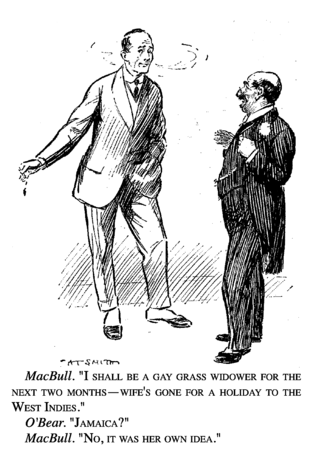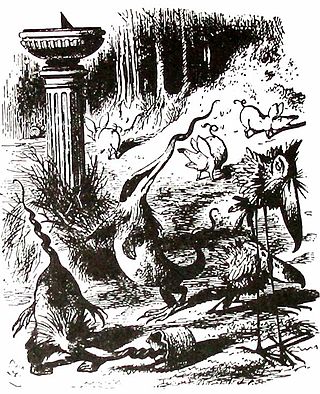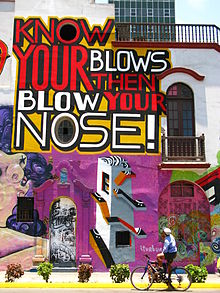
A pun, also rarely known as paronomasia, is a form of word play that exploits multiple meanings of a term, or of similar-sounding words, for an intended humorous or rhetorical effect. These ambiguities can arise from the intentional use of homophonic, homographic, metonymic, or figurative language. A pun differs from a malapropism in that a malapropism is an incorrect variation on a correct expression, while a pun involves expressions with multiple interpretations. Puns may be regarded as in-jokes or idiomatic constructions, especially as their usage and meaning are usually specific to a particular language or its culture.
A verb is a word that in syntax generally conveys an action, an occurrence, or a state of being. In the usual description of English, the basic form, with or without the particle to, is the infinitive. In many languages, verbs are inflected to encode tense, aspect, mood, and voice. A verb may also agree with the person, gender or number of some of its arguments, such as its subject, or object. Verbs have tenses: present, to indicate that an action is being carried out; past, to indicate that an action has been done; future, to indicate that an action will be done.
An adverb is a word or an expression that generally modifies a verb, adjective, another adverb, determiner, clause, preposition, or sentence. Adverbs typically express manner, place, time, frequency, degree, level of certainty, etc., answering questions such as how, in what way, when, where, to what extent. This is called the adverbial function and may be performed by single words (adverbs) or by multi-word adverbial phrases and adverbial clauses.
English grammar is the set of structural rules of the English language. This includes the structure of words, phrases, clauses, sentences, and whole texts.
The Finnish language is spoken by the majority of the population in Finland and by ethnic Finns elsewhere. Unlike the languages spoken in neighbouring countries, such as Swedish and Norwegian, which are North Germanic languages, or Russian, which is a Slavic language, Finnish is a Uralic language of the Finnic languages group. Typologically, Finnish is agglutinative. As in some other Uralic languages, Finnish has vowel harmony, and like other Finnic languages, it has consonant gradation.

A crossword is a word game consisting of a grid of black and white squares, into which solvers enter words or phrases ("entries") crossing each other horizontally ("across") and vertically ("down") according to a set of clues. Each white square is typically filled with one letter, while the black squares are used to separate entries. The first white square in each entry is typically numbered to correspond to its clue.

A cryptic crossword is a crossword puzzle in which each clue is a word puzzle. Cryptic crosswords are particularly popular in the United Kingdom, where they originated, as well as Ireland, Israel, the Netherlands, and in several Commonwealth nations, including Australia, Canada, India, Kenya, Malta, New Zealand, and South Africa. Compilers of cryptic crosswords are commonly called "setters" in the UK and "constructors" in the US. Particularly in the UK, a distinction may be made between cryptics and "quick" crosswords, and sometimes two sets of clues are given for a single puzzle grid.

A double entendre is a figure of speech or a particular way of wording that is devised to have a double meaning, one of which is typically obvious, and the other often conveys a message that would be too socially unacceptable, or offensive to state directly.

A figure of speech or rhetorical figure is a word or phrase that intentionally deviates from ordinary language use to produce a rhetorical effect. Figures of speech are traditionally classified into schemes, which vary the ordinary sequence of words, and tropes, where words carry a meaning other than what they ordinarily signify.

Nonsense verse is a form of nonsense literature usually employing strong prosodic elements like rhythm and rhyme. It is often whimsical and humorous in tone and employs some of the techniques of nonsense literature.

A homophone (ομόφωνο) is a word that is pronounced the same as another word but differs in meaning. The two words may be spelled the same, for example rose (flower) and rose, or spelled differently, as in rain, reign, and rein. The term homophone sometimes applies to units longer or shorter than words, for example a phrase, letter, or groups of letters which are pronounced the same as a counterpart. Any unit with this property is said to be homophonous.

A compound is a word composed of more than one free morpheme. The English language, like many others, uses compounds frequently. English compounds may be classified in several ways, such as the word classes or the semantic relationship of their components.
Untranslatability is the property of text or speech for which no equivalent can be found when translated into another (given) language. A text that is considered to be untranslatable is considered a lacuna, or lexical gap. The term arises when describing the difficulty of achieving the so-called perfect translation. It is based on the notion that there are certain concepts and words that are so interrelated that an accurate translation becomes an impossible task. Some writers have suggested that language carries sacred notions or is intrinsic to national identity. Brian James Baer posits that untranslatability is sometimes seen by nations as proof of the national genius. He quotes Alexandra Jaffe: "When translators talk about untranslatable, they often reinforce the notion that each language has its own 'genius', an 'essence' that naturally sets it apart from all other languages and reflects something of the 'soul' of its culture or people".
Standard Romanian shares largely the same grammar and most of the vocabulary and phonological processes with the other three surviving varieties of Eastern Romance, namely Aromanian, Megleno-Romanian, and Istro-Romanian.
Sananmuunnos, sometimes kääntösana, is a sort of verbal play in the Finnish language, similar to spoonerisms in English.
An attributive verb is a verb that modifies a noun in the manner of an attributive adjective, rather than express an independent idea as a predicate.

"Time flies like an arrow; fruit flies like a banana" is a humorous saying that is used in linguistics as an example of a garden path sentence or syntactic ambiguity, and in word play as an example of punning, double entendre, and antanaclasis.
Hote (Ho’tei), also known as Malê, is an Oceanic language in Morobe Province, Papua New Guinea.
Saliba is an Oceanic language spoken on the islets off the southeastern tip of Papua New Guinea. There are approximately 2,500 speakers of Saliba. Significant documentation of the language was undertaken by the Saliba-Logea documentation project, and hundreds of audio-video resources can be found in the project archive.

Matlatzinca, or more specifically San Francisco Matlatzinca, is an endangered Oto-Manguean language of Western Central Mexico. The name of the language in the language itself is pjiekak'joo. The term "Matlatzinca" comes from the town's name in Nahuatl, meaning "the lords of the network." At one point, the Matlatzinca groups were called "pirindas," meaning "those in the middle."












